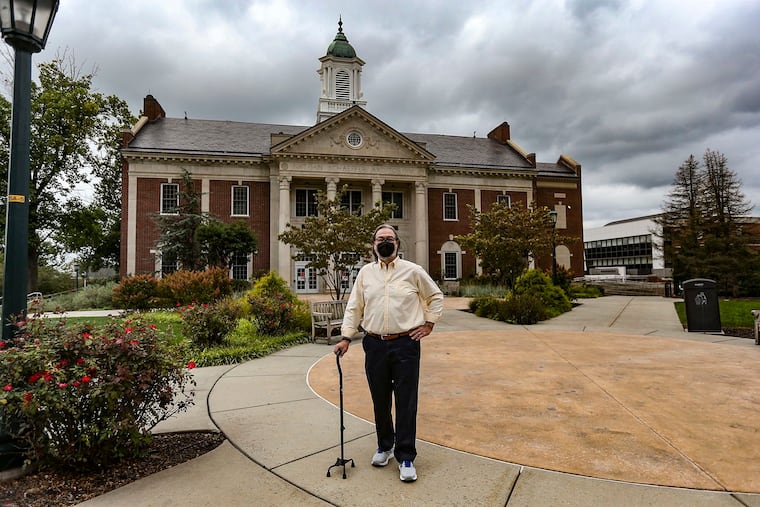PASSHE faculty say they are being denied accommodations for disabilities
“While we do not comment on personnel and legal matters, ... the State System provides a robust and interactive process for individuals to seek reasonable accommodations,” said a system spokesperson.

A small group of Pennsylvania state university faculty who said they have been denied accommodations for their disabilities asked the system’s board of governors Thursday to make changes.
“If this type of discrimination was not explicitly proposed by the chancellor’s office, it was at least implicitly condoned, and it is time for it to stop,” said Stephen Oross III, an associate professor of psychology at Kutztown University.
Oross sued the Pennsylvania State System of Higher Education for denying his request to teach online in fall 2021 after he had a heart transplant. With cases of COVID-19 still surging, he said, he didn’t feel safe returning to in-person teaching, and his doctors warned against it. Kutztown at the time required masks but did not mandate the vaccine.
A U.S. District Court judge ruled in 2023 that Oross should have been allowed to continue to teach online even after the school moved instruction back to in-person. But the case is ongoing to determine financial and injunctive relief.
» READ MORE: Kutztown professor with heart transplant should have been able to teach from home, judge says
He was one of a handful of professors who told the board on Thursday that the system is failing to follow the Americans with Disabilities Act, which allows for “reasonable” accommodations, and that the system deliberately starts from the position of looking for ways to deny requests.
Jerry Carbo, a professor of management and marketing at Shippensburg University and a lawyer with expertise in the disabilities law, called PASSHE’s dealings “unethical, unlawful, and strategically unsound.” He said his wife was fired from a Shippensburg University Head Start program on Christmas Eve 2020 during the height of the pandemic for declining to work in unsafe conditions.
Cynthia Shapira, chair of the board of governors, said she appreciated the comments.
“It is not going unheard,” she said.
A PASSHE spokesperson later issued a statement: “While we do not comment on personnel and legal matters, I can say the State System provides a robust and interactive process for individuals to seek reasonable accommodations.”
» READ MORE: A professor got a heart transplant, so he wanted to teach online. His university said no.
But Rose Heilman-Houser, an associate professor at Slippery Rock University, said she, too, was denied a request to teach online after an aortic valve replacement and heart failure diagnosis. She has paperwork from doctors saying she should teach online, but in the spring, she is scheduled for a graduate course that requires her to be in person three times. She will have to take sick days, she said.
“I will ultimately either be forced out due to a lack of sick days or I will be forced to pursue legal procedures,” she said. “I respectfully request that you remedy this situation.”
Timothy Miller, who was an English professor at Millersville University for 39 years, said he was told that no one — staff or students — was allowed to help him get to and from class in a wheelchair and, later, with a cane after a hip replacement and a subsequent surgery. Students helped him anyway, he said.
“I just retired last semester and in part I did because of the way I was treated,” he said.
Kenneth M. Mash, president of the Association of Pennsylvania State College & University Faculties, the union that represents about 5,500 faculty and coaches, said that during contract negotiations, his team tried to get the system to allow an impartial panel to review faculty requests for accommodations.
“We were shut down,” he said.
Also at the meeting on Thursday, the board approved a motion to seek a 6.5%, or $40.3 million, increase in state funding for 2025-26, for a total of $661.1 million. The increase would both cover inflationary increases and allow the system to again freeze tuition.
The system has held tuition flat at $7,717 per year since 2018-19 in large part because of increases in state funding.
The request will be sent to the governor and the state legislature for consideration.
The system also released fall enrollment numbers for its individual universities. Last week, outgoing chancellor Daniel Greenstein announced that the system’s enrollment overall had declined by 179 students, or 0.2%, the smallest decrease in more than a decade. Enrollment stands at 82,509.
Five universities saw increases: Millersville, 257 students, or 3.8%; East Stroudsburg, 173 (3.2%); Kutztown, 41 (0.6%); West Chester, 94 (0.5%); and Slippery Rock, 32 (0.4%).
Five others showed decreases: Cheyney, 107 students, or 14.8%; Pennsylvania Western, 471 (4.2%); Indiana, 173 (1.9%); Shippensburg, 20 (0.4%); and Commonwealth, 5 (less than 0.1%).
The board also bid farewell to Greenstein, who concludes his six-year tenure this week. Greenstein on Nov. 1 will join the higher education practice of Baker Tilly, an international accounting and advisory firm.
“You were a transformative chancellor,” said former Pennsylvania Gov. Tom Wolf in a video message shown at the meeting. “You did amazing things to confront the challenges that faced you and every other leader in higher education.”
He also was praised by Mash, state legislators, students, and university presidents.